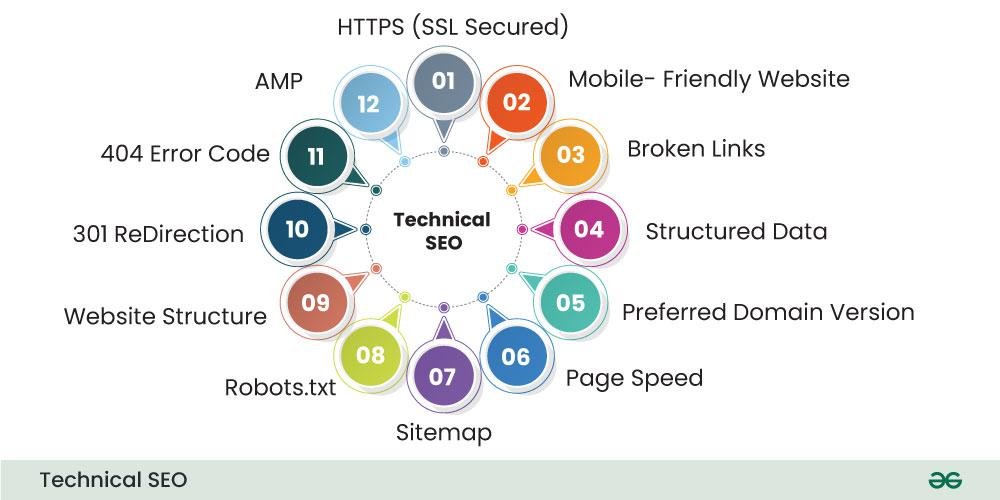Technical SEO plays a crucial role in improving a website’s performance, ensuring search engines can crawl and index it effectively. For small businesses, optimizing technical SEO enhances rankings, user experience, and website visibility. Below are the best technical SEO practices small businesses should follow.
1. Ensure Your Website is Mobile-Friendly
Google prioritizes mobile-friendly websites through mobile-first indexing. A responsive design ensures that your site adapts to different screen sizes, improving user experience and rankings.
How to Optimize for Mobile:
- Use a responsive website design
- Optimize font sizes and button spacing for touchscreens
- Test mobile-friendliness using Google’s Mobile-Friendly Test
Learn More About Website Development
2. Improve Website Loading Speed
Site speed is a major ranking factor. A slow website results in high bounce rates, negatively affecting SEO.
Ways to Improve Speed:
- Optimize images using compression tools
- Enable browser caching and use a Content Delivery Network (CDN)
- Minimize HTTP requests and reduce unnecessary scripts
Boost Your Website Performance
3. Optimize URL Structure
A clean, structured URL improves crawlability and user experience. Use short, descriptive URLs that include keywords.
Best Practices for URLs:
- Avoid unnecessary parameters and numbers
- Use hyphens (-) instead of underscores (_)
- Keep URLs concise and relevant
4. Secure Your Website with HTTPS
Google prefers HTTPS over HTTP for security reasons. Websites with an SSL certificate rank higher and build user trust.
Steps to Implement HTTPS:
- Purchase an SSL certificate from a trusted provider
- Update internal links to HTTPS
- Check for mixed content issues after migration

5. Optimize Website Crawlability and Indexing
Search engines need to crawl and index your site efficiently. Optimizing crawlability ensures all important pages appear in search results.
Tips for Better Indexing:
- Submit a sitemap.xml to Google Search Console
- Use robots.txt to control which pages search engines should crawl
- Avoid duplicate content issues with canonical tags
Improve Your Local SEO Strategy
6. Implement Structured Data (Schema Markup)
Structured data helps search engines understand your content better and improves search visibility. Schema markup enhances rich snippets, such as star ratings and FAQs.
Types of Schema for Small Businesses:
- Local Business Schema – Boosts local search presence
- Product Schema – Helps e-commerce sites display product details in search results
- FAQ Schema – Improves visibility in voice searches
7. Fix Broken Links and Redirects
Broken links harm user experience and SEO. Regularly check for 404 errors and implement proper 301 redirects for old pages.
How to Fix Broken Links:
- Use tools like Google Search Console or Screaming Frog to identify issues
- Replace or remove broken links
- Redirect outdated pages to relevant URLs
8. Optimize Internal Linking Structure
Internal linking distributes link equity across your site and improves crawlability. Use relevant anchor texts to link important pages.
Best Practices for Internal Links:
- Link to high-authority pages within your site
- Use keyword-rich anchor texts naturally
- Avoid excessive internal links on a single page
9. Minimize JavaScript and CSS Files
Large JavaScript and CSS files slow down page speed. Minifying these resources helps improve performance.
Optimization Tips:
- Use lazy loading for images and videos
- Minify CSS, JavaScript, and HTML files
- Remove unused scripts and plugins
10. Monitor Technical SEO with Google Search Console
Regularly monitoring your site’s health helps detect issues before they impact rankings.
Essential Checks in Google Search Console:
- Fix coverage errors and crawl issues
- Monitor core web vitals (LCP, FID, CLS)
- Submit and update your XML sitemap
Final Thoughts: Strengthening Small Business SEO with Technical Optimization
For small businesses, technical SEO is key to better rankings and higher organic traffic. By implementing these best practices, you ensure that search engines can effectively crawl, index, and rank your website.
Need Help with SEO? Contact Social Media Max today! Visit our website or call 0161 399 3517. You can also email Syed_66@hotmail.com for expert guidance on optimizing your website.
